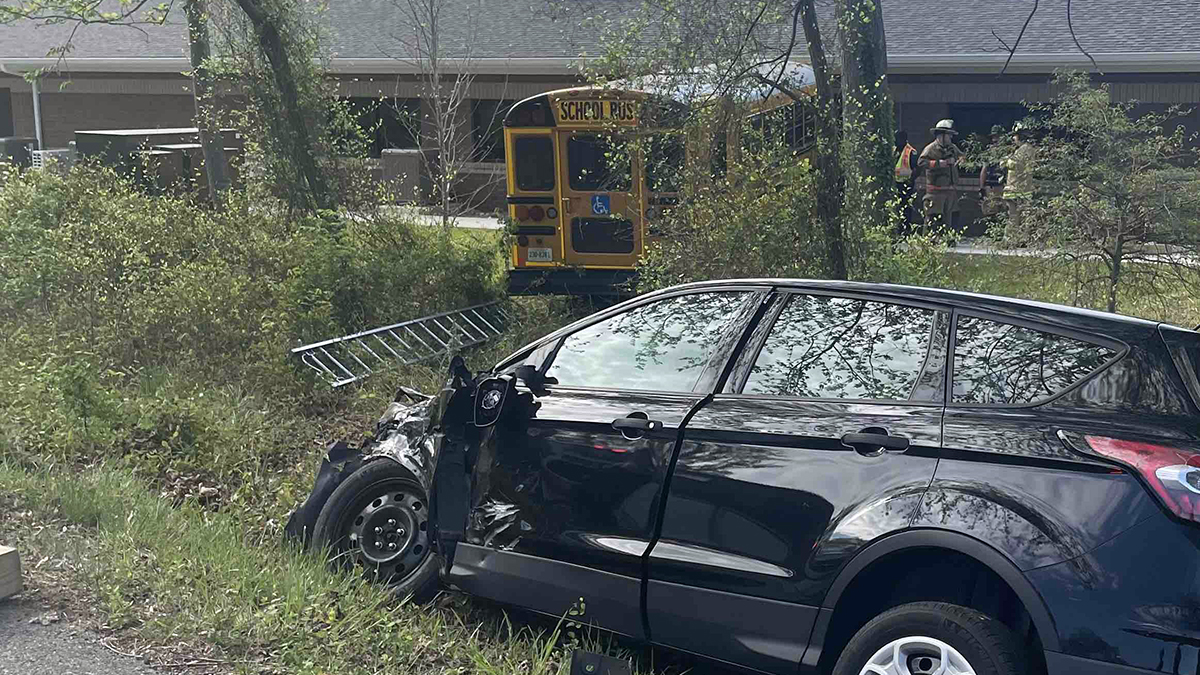A steady stream of protesters has turned the street in front of the Supreme Court building into an open-air forum encapsulating the fierce national debate over abortion after the leak of a draft opinion suggesting the justices would overturn Roe v. Wade, the 1973 landmark ruling that legalized abortion nationwide.
Both supporters and foes of abortion rights have gathered during large, organized weekend marches and on weekdays when the court is scheduled to release its opinion. They march and chant; sometimes they attempt to shout the other side down.
For each, the reasons for protesting are deeply personal.
Here's what some had to say:
We're making it easier for you to find stories that matter with our new newsletter — The 4Front. Sign up here and get news that is important for you to your inbox.
___
Benita Lubic of Washington
A widow, Lubic was joined by her daughter Wendie Lubic, sitting in a black canvas camping chair between the U.S. Capitol and the Supreme Court, holding a handwritten sign saying, “I don’t regret my abortion.”
Local
Washington, D.C., Maryland and Virginia local news, events and information
In 1968, and with three children already, Benita Lubic’s IUD birth control device failed. She was allowed a medical abortion in Washington, D.C., but doctors also performed a partial hysterectomy, she believes, to ensure she would have no further pregnancies.
“I’m a senior citizen so I am way past having another child, but I do want to help younger people, particularly those who have been raped and abused, that they will be able to get an abortion,” said Lubic, 86.
Wendie Lubic, 60, also had an abortion, in 1986, although she didn't tell her mother about it until years later. “We just weren’t ready to get married at that time,” says Wendie Lubic, who later did marry the man and they have two daughters.
Benita Lubic blames Senate Republicans for blocking the Supreme Court nomination of Merrick Garland during the final months of President Barack Obama’s last term, but then fast-tracking the nomination of the newest justice, Amy Coney Barrett, after Ruth Bader Ginsburg died in September 2020, less than two months before the election.
"I’m just sorry that Ruth Bader Ginsburg isn’t alive to support us,” she said.
___
Grace Rykaczewski of Morristown, New Jersey
With a hot pink bullhorn, matching lipstick, and pink eyeshadow, Grace Rykaczewski, 21, was in a triumphant mood at the thought of Roe v. Wade’s potential demise.
“Once it’s overturned, for the pro-life movement this is only the beginning,” said Rykaczewski, who goes by the handle, “Pro Life Barbie” on social media. “I think the next goal is twofold. On one hand we will want to enact laws on a state level to make abortions as rare as possible. On the other hand, a goal is to make women feel like they don’t need abortions anymore, to make help for women in difficult situations so there isn’t even a demand for abortion anymore.”
Rykaczewski is already making plans to return to the Supreme Court to celebrate if the opinion overturning Roe v. Wade is released.
___
Rob Zaidel and Danny Drees, both of Washington
The pair joined abortion rights protesters on Saturday, May 14, outside the White House on their way to the National Mall during protests across the country.
“It’s important for me, identifying as a man, to have that presence here," said Zaidel, 28. “It’s important for all of us to come together, it’s not just a women’s issue.” He said he feared that the court wouldn't stop at abortion and that gay marriage could be one of the things that's next.
Drees, 27, said, “It’s important for a democracy to have equal rights for all, and this makes women and all people with uteruses less equal and have less power.”
___
Julia Bradley-Cook of Washington
Seven months pregnant, Bradley-Cook marched by the court with the words “No Forced Pregnancy” written across her bare belly.
“I think there is a dichotomy set up on abortion and pregnancy,” she said. “It’s important to show that just because we support the right to choose, doesn’t mean we can’t also be pregnant.”
She and another pregnant friend represented the group 500 Women Scientists.
___
K’Vone Cropp, and Kayla Cropp of Richmond, Virginia
The 26-year-old twin sisters came to the Supreme Court with the group Students for Life on a recent day when court rulings were announced, hoping to be there when the Roe v. Wade ruling came down. The group wore light blue T-shirts with the phrase, “We are the pro-life generation,” emblazoned on the front.
“We aren’t big talkers,” said Kayla Cropp. “We are just here supporting the cause and abolishing abortion.”
___
Lauren McKillip and her wife Marissa McKillip of Crofton, Maryland
Marissa McKillip held their son Lincoln, 4, on her shoulders as her wife, Lauren, cradled their 2-year-old daughter, Thea, in a soft blue wrap.
“It’s important for us to come here for our daughter, for our marriage, for all the things now established so that our daughter doesn’t have to fight for it,” said Marissa McKillip, 28.
“I think Roe was a foundational court case that paved the way for a lot of other things we saw happen after that like interracial marriage, and gay marriage — the government not having so much overreach into our personal lives,” said Lauren McKillip, 29. “If it’s overturned, we will come out again for sure, to just keep fighting, fight for what comes next."
___
Sonia Glenn of Fairfax, Virginia
A green foam crown, flowing green silk dress and sash proclaiming “Abortion Liberty” transformed Sofia Glenn into the abortion rights-themed Lady Liberty.
“I can’t believe somebody else is going to make decisions about my body,” said the 37-year-old, who immigrated to the U.S. from Mexico 15 years ago. “I was raised as a Catholic. But I always thought it was so unfair, that religion and men, priests, have the rights to tell you what you can and cannot do with your body. It doesn’t make any sense to me.”
Glenn said she refers to her birth control pills as “Liberty Pills” and plans to help make the abortion pill option available for those who can't access them if Roe v. Wade is overturned.
___
Noah Slayter of Manassas, Virginia
Slayter, 20, decided to demonstrate against abortion after being part of a family that fostered 10 children.
“Those on the abortion side like to purport that those in foster care could have a terrible life. Who is to say that they’ll have a terrible life? The kids sleeping in the room across from me, there’s people that think they should have been killed,” he said.
Slayter said opponents of abortion rights are primed for a state-by-state battle to both restrict the procedure and promote adoption and foster care options.
“Previously the movement had one battle, a national one. And now we will have 50,” he said.
___
Abby Thomas of Los Angeles
Wearing green and white face paint smeared on her cheeks and forehead, Thomas, 27, spent five days protesting outside the court.
“A lot of organizations are at the point where they are planning for a post-Roe world. But it’s easier to fight for our rights while we still have them,” she said.
Thomas said the abortion rights community was hoping for a massive backlash at the voting booth if the court rules to lift federal abortion protections.
“If it is overturned, the majority of the country supports abortion access,” she said, “and I hope the majority of the country would come out, to show the Supreme Court and the Republican Party the extent they’ve wronged the American people.”
___
Tanya Ditty of Alexandria, Virginia
Ditty, 62, wore a black T-shirt with the phrase, “She prays, she votes.”
A teenager when Roe v. Wade came down, she said the abortion issue should be decided not by the federal government, but by the states, "where the people closest to local government can influence their state legislators.”
“We will continue to go to those statehouses, year after year, and attempt and attempt and attempt," she said. "We will stand side by side with pregnancy centers and churches that provide services. It’s so not true that we won’t support women, we will provide avenues.”
___
Ekerin Shopshire of Silver Spring, Maryland
A kindergarten teacher in Montgomery County, Shopshire, 47, and a friend demonstrated outside the Supreme Court in May and later joined a small protest outside the home of one of the justices.
"We aren’t being heard and that’s scary,” she said.
If Roe v. Wade is overturned, Shopshire saw the battle over abortion moving to the states.
“I foresee a lot of traveling, crossing of state lines to get the medical attention people may want or need. I see an increase in deaths, for women who aren’t able to easily cross those state lines for the medical help they need,” she said. “The back-alley abortions are going to make a comeback, that’s just what’s going to happen.”
___
Beila Kraus of Chappaqua, New York
Though still a teenager and unable to vote, Kraus convinced her parents to let her take a bus to Washington to protest for several days while staying with fellow members of the activist group Rise Up 4 Abortion Rights.
Kraus, 15, said she’s deeply frustrated by her own inability to cast a vote on the issue, and fears it could take years of struggle to reverse a rollback of Roe v. Wade’s abortion protections.
“Being outside the Supreme Court, for me it’s representation as the people making this decision are in there. It’s this image of the power that these justices hold,” she said.
___
Alexandra McPhee of Arlington, Virginia
McPhee came to the Supreme Court with the anti-abortion advocacy group Concerned Women for America, where she is director of government relations.
“I want to be out here to show that this is an issue that I care about that I believe is helpful for all women, all families, to have more protections for life than there are now. And this decision will make that possible,” said McPhee, 29.
___
Christal Surowicz of Cheverly, Maryland
Surowicz, 58, wore a black judge’s robe covered with red plastic coat hangers.
“I am a strong supporter of women’s rights and I feel like abortion is a necessary evil. We don’t think let’s go out and promote abortion, but we feel it needs to be available,” she said. “The ramifications for it not being available are just too much. Part of it is controlling women but it also impacts women’s health.”
An audiologist, Surowicz acknowledged that defenders of abortion rights face an uphill battle. “We need to elect more officials who will be supportive."



